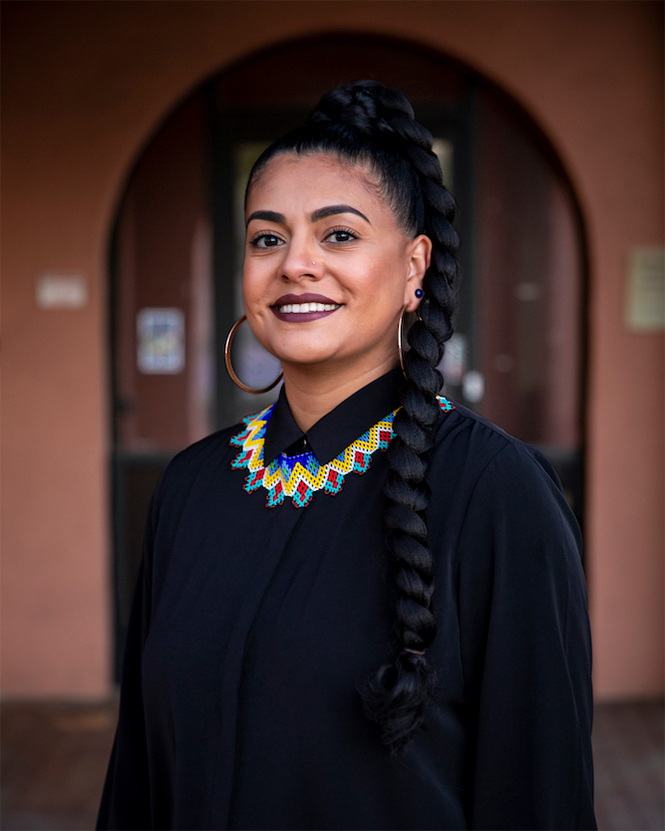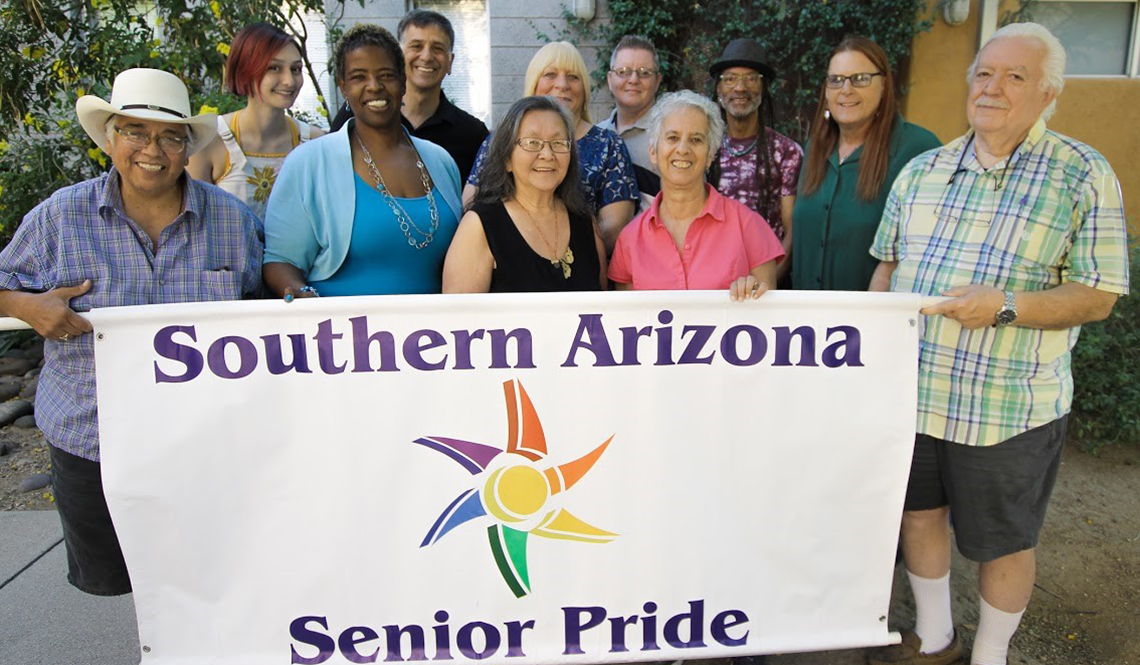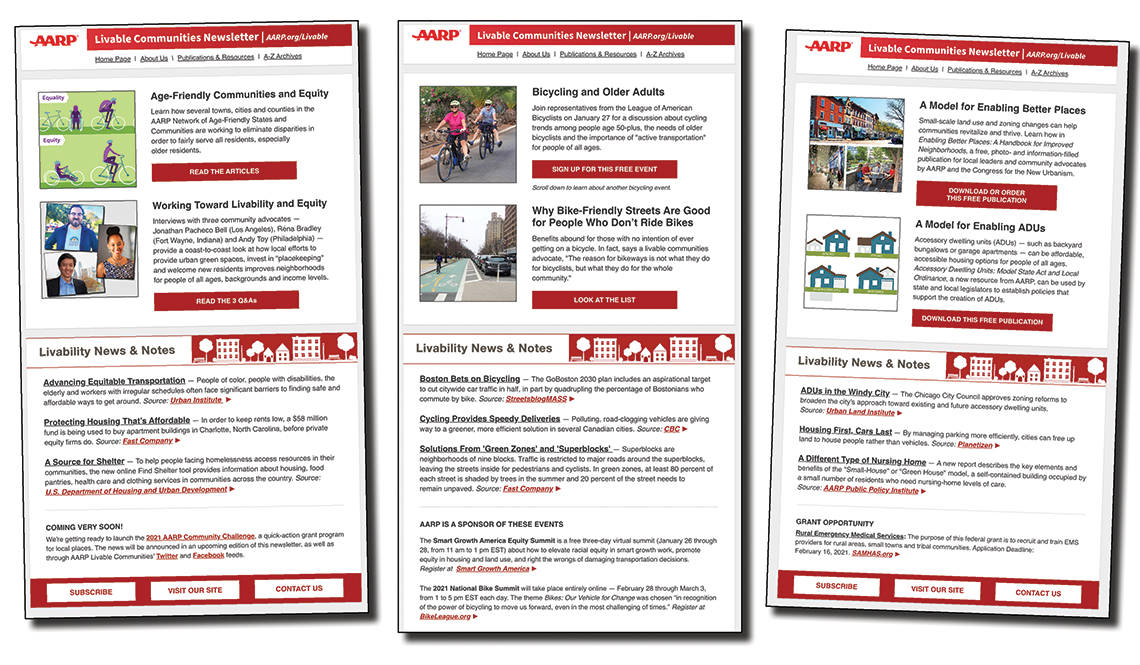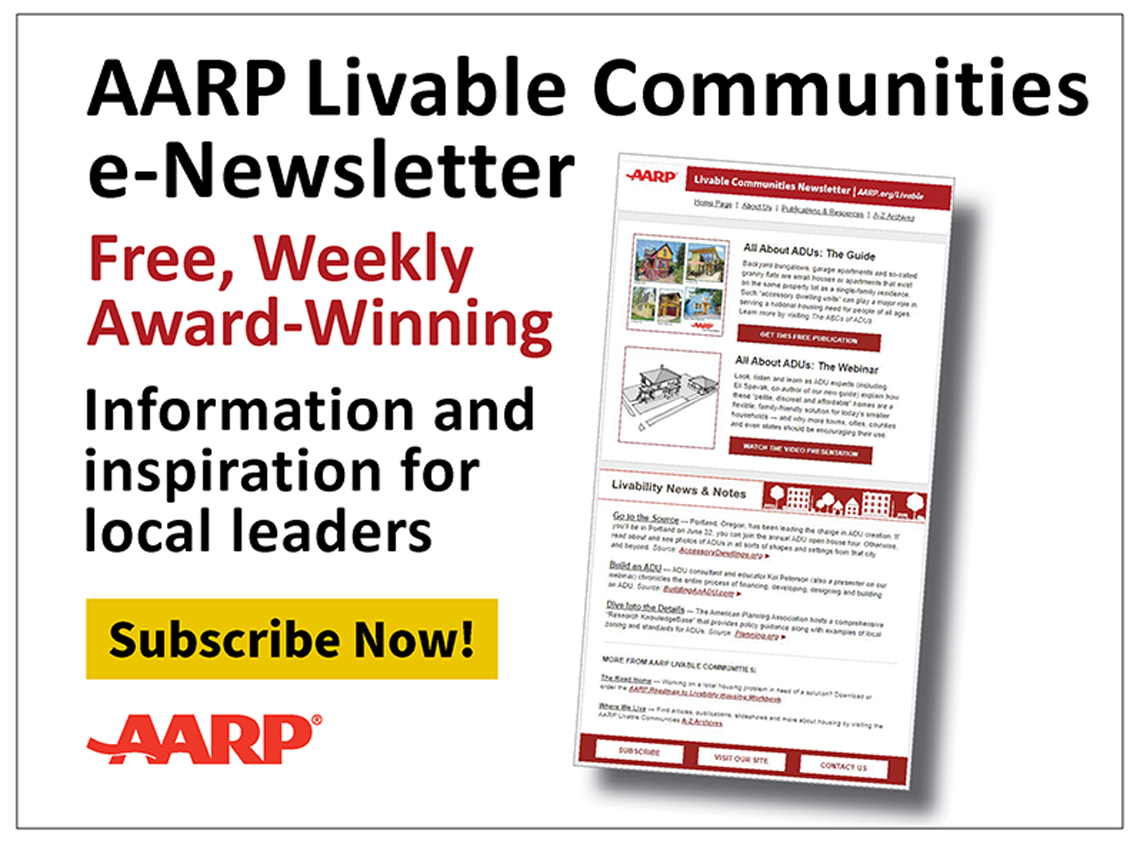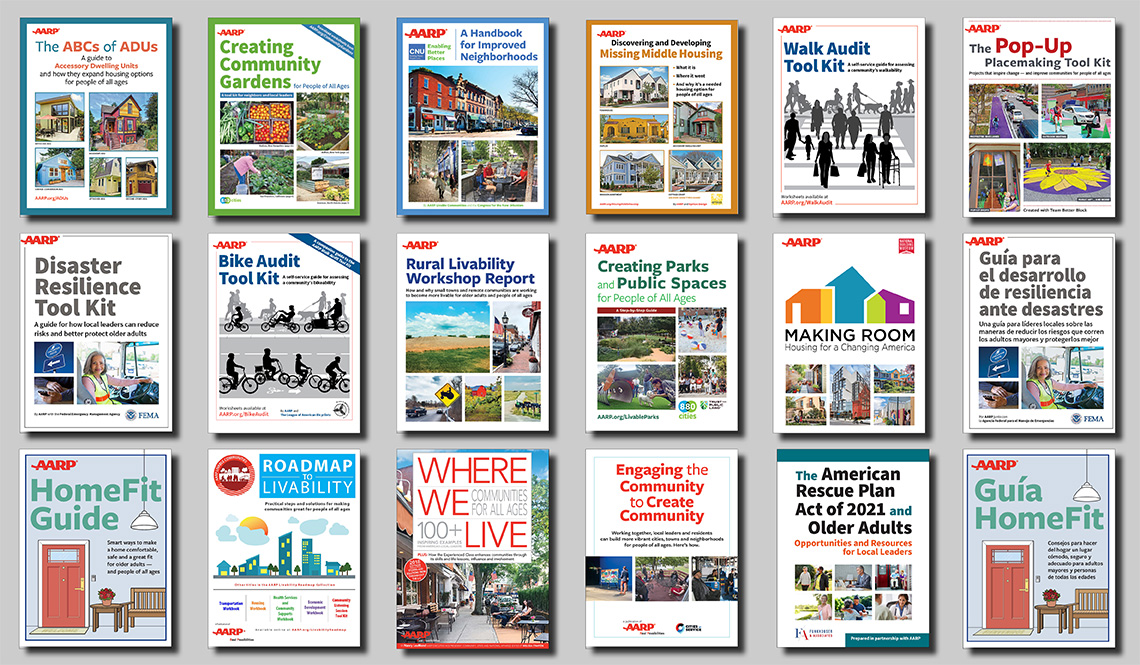Age-Friendly Tucson, Arizona, and Equity
A look at how the city is working to ensure fair access and opportunities for its older adults
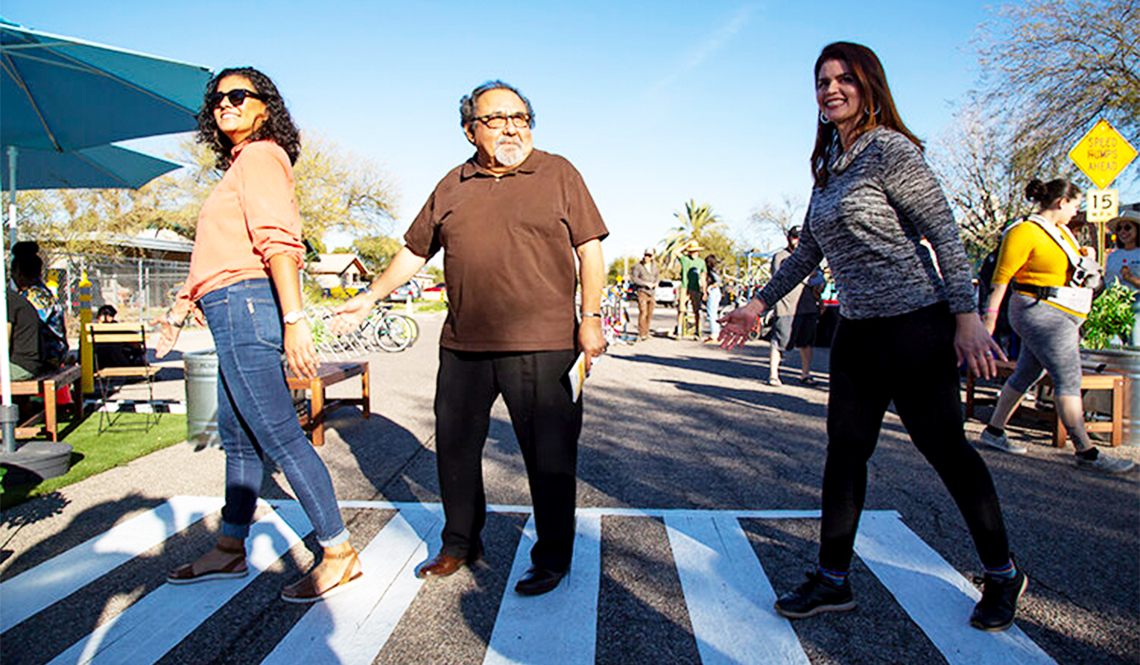
Photo by Grecia Ramirez for the Office of Lane Santa Cruz, Tucson City Council, Ward 1
Tucson’s Age-Friendly Action Plan features transportation initiatives related to Complete Streets; pedestrian and bicycling safety; and improvements to make streets, sidewalks and transit usable for people with mobility differences. In this photo, City Council member Lane Santa Cruz (right) and neighbors use a demonstration crosswalk during an Open House event in February 2020.
The Community
Tucson, Arizona, is home to half a million residents — 25 percent of whom are age 60 or older. The city joined the AARP Network of Age-Friendly States and Communities in 2016 and adopted its Age-Friendly Action Plan in 2019.
Partner Organizations
Community Representatives
- Lane Santa Cruz, Member, Tucson City Council, Ward 1
- Lavina Tomer, Executive Director, Southern Arizona Senior Pride
Equity Focus
- Housing and transportation for low-income older adults and households
- Advocacy and inclusion of LGBTQI+ older adults
The Work
City Council member Santa Cruz represents Ward 1, which includes Tucson's downtown and its west and south sides. She describes the importance of applying equity strategies in the city’s work.
New Leadership, New Approaches
"We recently established the Commission on Equitable Housing and Development. Our aim is to give community members a powerful voice in the development process, so they can advocate for strategies that ensure housing affordability and allow people to age-in-place in our historic neighborhoods," says Santa Cruz. "Ward 1 is home to many working families and seniors with fixed incomes who are struggling to pay rising rents and property taxes. We need to make sure that new development isn't pushing residents out and we need policies that support multi-generational housing for families caring for elders."
COVID Creates Opportunities for New Connections
"In a place like Tucson, the infusion of funding from the CARES (Coronavirus Aid, Relief and Economic Security) Act, has made a big difference. We've used funds to make our public transit free, including our on-demand programming.
“We always ask who is at the table and who isn’t. If people aren’t there because we are meeting at times and at places that make it difficult for them to attend, we need to address that. If they aren’t there because they haven’t been invited, we need to create new opportunities."
— Lane Santa Cruz, Tucson City Council
"We are piloting projects like Slow Streets/Calles Lentas, where we work with residents to identify streets that can be reconfigured to support physical distancing and encourage physical activity. With our Transportation and Mobility Department, we temporarily close certain streets to all but local traffic, giving Tucsonans more space to safely walk, bicycle and run.
"We knew that thousands of community members didn’t have access to the internet before the pandemic. With the shift to virtual meetings, schooling and gatherings, we invested CARES Act funding to expand free public WiFi to underserved areas of the city."
"As a council member, the COVID-19 pandemic has changed how I engage with my constituents. In March my office launched Know Tucson, which is a combination of weekly podcasts and a monthly newsletter. The podcast brings in content experts from the city, small business owners and community members. We talk about issues our neighbors care about.”
Tomer describes Southern Arizona Senior Pride’s work to support Tucson's LGBTQI+ older adult community.
Advocating for LGBTQI+ Inclusion
Southern Arizona Senior Pride has had a consistent presence in the ELDER Alliance, which played a sizable role in bringing Tucson's age-friendly plan to fruition. Senior Pride’s efforts align with the "Respect and Social Inclusion" domain in the 8 Domains of Livability.
Along with other community partners, the organization works to reduce social isolation, resist ageism, promote safety and authenticity, further cultural diversity and increase engagement of older adults in the community. Senior Pride is active in policy and program discussions in order to build relationships and integrate the needs of LGBTQI+ older adults into mainstream service organizations. Senior Pride's efforts to keep LGBTQI+ elders engaged and less isolated have been intensified during the pandemic.
"Our efforts to build connections with other senior-serving organizations have been made with the intention of normalizing the presence of LGBTQI+ people as equal members of the community," says Tomer. "Partner organizations are interested in learning how to welcome and serve older LGBTQI+ adults as well as learning about our community’s history and culture. Through these relationships, some of our partners have made changes in their use of language, surveys, websites and messaging to better support the LGBTQI+ older adult community."
“Prejudice and discrimination against LGBTQI+ people are long-standing conditions that have been barriers to equitable and safe access to public and private services."
— Lavina Tomer, Southern Arizona Senior Pride
Tailored Programming
Southern Arizona Senior Pride provides multiple ways for LGBTQI+ older adults to engage. It hosts monthly gatherings, support groups, advanced care planning workshops, networking and speakers (now via Zoom). It publishes a bimonthly newsletter, The Senior Forum, which is distributed widely in print and online. The organization also sponsors educational and social events focused on health and well-being and arts and culture.
"To reduce social isolation we offer the Community Cares program in which trained volunteers visit — over the phone during COVID — once a week to talk, read aloud, write letters and play games," Tomer explains, adding that volunteers can also provide information about LGBTQI+ services and resources.
Southern Arizona Senior Pride collaborates with the Pima Council on Aging to deliver Visibility Matters, a program that provides cultural competency training to staff at long-term care facilities, senior centers, in-home care provider organizations and others who serve LGBTQI+ older adults.
Moving Forward
"We're consulting with other groups about how we can be more inclusive of communities of color," says Tomer. "In 2021 we hope to educate and engage our board, volunteers and participants in learning about disparities and intersectionality concerning racial and ethnic inequities as well as implementing services, programming and outreach efforts that reflect that understanding.”
Related Resources
- Commission on Equitable Housing and Development
- Know Tucson
- Southern Arizona Senior Pride Community Cares
- The Senior Forum
- Tucson Slow Streets/Calles Lentas
- Visibility Matters
AARP Links
- Learn about the AARP Network of Age-Friendly States and Communities
- Check out the network's Member List
- Connect with AARP Arizona
- Find Age-Friendly Responses to COVID-19
Visit "Age-Friendly Network Communities and Equity" to read about another community. »
Reported by Mary Kay Bailey | Fall 2020 | Population data from the U.S. Census
Stay Informed
The weekly, award-winning AARP Livable Communities e-Newsletter provides local leaders with information and inspiration for making their town, city or neighborhood more livable for older adults and people of all ages. Subscribe today!
AARP.org/Livable
Enter a topic, name, place, etc.

